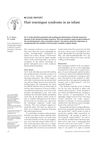60 citations,
August 2022 in “ESMO Open” Trastuzumab deruxtecan is effective for HER2-positive breast cancer but requires careful management of side effects.
[object Object]  5 citations,
August 2015 in “Bioscience, Biotechnology, and Biochemistry”
5 citations,
August 2015 in “Bioscience, Biotechnology, and Biochemistry” Obese mice with a leptin gene mutation have a longer resting phase in their hair cycle, which may help understand certain hair loss conditions.
 5 citations,
January 2013 in “Journal of Cosmetics, Dermatological Sciences and Applications”
5 citations,
January 2013 in “Journal of Cosmetics, Dermatological Sciences and Applications” New treatments for hair loss are promising.

Women with female pattern hair loss tend to have lower self-esteem and body image concerns, but higher self-esteem is linked to more self-compassion.
 10 citations,
June 2005 in “The journal of investigative dermatology/Journal of investigative dermatology”
10 citations,
June 2005 in “The journal of investigative dermatology/Journal of investigative dermatology” FP-1 is a key protein in rat hair growth, active only during the growth phase.
 14 citations,
February 2007 in “The Journal of Bone and Joint Surgery”
14 citations,
February 2007 in “The Journal of Bone and Joint Surgery” A baby's toe was saved from serious damage by quickly removing a hair wrapped tightly around it.
 7 citations,
January 2019 in “Pharmaceutical Biology”
7 citations,
January 2019 in “Pharmaceutical Biology” Eclipta prostrata helps hair growth and maintains the growth phase by affecting certain growth factors.
 6 citations,
February 2023 in “Journal of nanobiotechnology”
6 citations,
February 2023 in “Journal of nanobiotechnology” The new anti-acne treatment HA-P5 effectively reduces acne by targeting two key receptors and avoids an enzyme that can hinder treatment.
 68 citations,
June 2005 in “Expert Opinion on Therapeutic Targets”
68 citations,
June 2005 in “Expert Opinion on Therapeutic Targets” Oestrogens help maintain healthy skin, heal wounds, and may protect against skin aging and cancer.
 1 citations,
October 2021 in “Gene, cell and tissue”
1 citations,
October 2021 in “Gene, cell and tissue” Grape sap may help reduce hair loss and promote hair growth in rats.
[object Object]  9 citations,
February 2016 in “Cambridge University Press eBooks”
9 citations,
February 2016 in “Cambridge University Press eBooks” The conclusion is that self-concept, shame, and emotion regulation are key factors in hoarding disorder, body dysmorphic disorder, and trichotillomania, and should be targeted in treatment and research.
 1 citations,
September 2015 in “Clinics in Dermatology”
1 citations,
September 2015 in “Clinics in Dermatology” The guide helps doctors diagnose hair problems by suggesting a thorough patient history, physical exams, and various diagnostic tools.
 65 citations,
February 2009 in “The journal of investigative dermatology/Journal of investigative dermatology”
65 citations,
February 2009 in “The journal of investigative dermatology/Journal of investigative dermatology” Anti-acne medications may work by reducing the activity of a protein involved in acne development.
 98 citations,
July 2014 in “Trends in Molecular Medicine”
98 citations,
July 2014 in “Trends in Molecular Medicine” Hair follicles are hormone-sensitive and involved in growth and other functions, with potential for new treatments, but more research is needed.
 33 citations,
May 2006 in “Journal of Investigative Dermatology”
33 citations,
May 2006 in “Journal of Investigative Dermatology” PTHrP and its receptor can control blood vessel growth and hair development in mouse skin.
 6 citations,
July 2015 in “Journal of Investigative Dermatology”
6 citations,
July 2015 in “Journal of Investigative Dermatology” Chicken feather gene mutation helps understand human hair disorders.
 March 2014 in “Journal of The American Academy of Dermatology”
March 2014 in “Journal of The American Academy of Dermatology”  6 citations,
February 2016 in “British Journal of Dermatology”
6 citations,
February 2016 in “British Journal of Dermatology” A woman with a drug allergy to anakinra was successfully desensitized, allowing her to continue treatment without allergic reactions.
 16 citations,
March 2016 in “Clinical ophthalmology”
16 citations,
March 2016 in “Clinical ophthalmology” Bimatoprost is safe and improves eyelash growth in healthy kids but not in those with eyelash loss from chemotherapy or alopecia.
 4 citations,
August 2021 in “Frontiers in Cell and Developmental Biology”
4 citations,
August 2021 in “Frontiers in Cell and Developmental Biology” Stress can cause hair loss by affecting nerve-related hair growth, and noradrenaline might help prevent this.

The paper concludes that the patchiness of alopecia areata is likely due to when the immune attack happens in the hair growth cycle.
 2 citations,
January 2021 in “Przegląd Dermatologiczny (1959)”
2 citations,
January 2021 in “Przegląd Dermatologiczny (1959)” The article discusses various treatments for different types of non-scarring hair loss.
 36 citations,
June 2009 in “Nanomedicine”
36 citations,
June 2009 in “Nanomedicine” Fullerene nanomaterials help hair grow faster and increase hair follicles.
 17 citations,
January 2010 in “International journal of trichology”
17 citations,
January 2010 in “International journal of trichology” A man experienced hair loss from radiotherapy, which can be temporary or permanent depending on radiation dose, with potential treatments available.
 11 citations,
September 2011 in “British Journal of Dermatology”
11 citations,
September 2011 in “British Journal of Dermatology” New ABCA12 gene mutations were linked to a skin condition with scaling and hair loss, and a treatment helped with hair loss in a related case.
1 citations,
January 1998 in “International journal of cancer” Rubbing vitamin D3 on skin can help prevent hair loss from chemotherapy and slow breast tumor growth in mice.
 76 citations,
August 2007 in “Supportive care in cancer”
76 citations,
August 2007 in “Supportive care in cancer” Chemotherapy often causes skin, nail, and hair side effects, significantly impacting quality of life.
 26 citations,
March 2014 in “Rheumatology”
26 citations,
March 2014 in “Rheumatology” Some drugs used to treat inflammation may cause hair loss.
 April 2016 in “Journal of The American Academy of Dermatology”
April 2016 in “Journal of The American Academy of Dermatology” Using a niacinamide cream can improve life quality for breast cancer patients during chemotherapy.
 18 citations,
January 1999 in “CNS Drugs”
18 citations,
January 1999 in “CNS Drugs” Some anticonvulsant drugs can cause skin reactions, ranging from mild to severe, and managing these reactions is important for patient care.



























